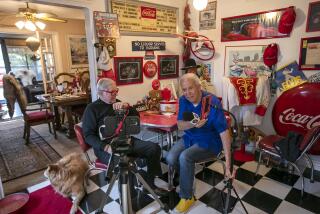Patagonia Again Tops for Workers
- Share via
Maybe it was the organic food dished out at Patagonia’s cafeteria that swayed Fortune magazine.
Or maybe it was the on-site child care, company-sponsored training sessions in nonviolent civil disobedience or the $2,000 employee incentive to buy environmentally friendly vehicles.
Whatever the reason, Fortune has again named Patagonia one of the 100 best companies to work for in America, citing the Ventura-based outdoor clothing maker as a shining example of corporate excellence in these dark times of recession and layoffs.
The company, which has 1,000 employees worldwide and last year sold $223 million worth of clothing, has made Fortune’s Top 100 list each of the five years it has been published. It ranked 41st this year--up 17 places from 2001.
But even in this climate of corporate mergers and meltdowns, Chief Executive Michael Crooke wants employees to know he’s not willing to settle for the middle of the pack when it comes to measuring up against the best.
“There just can’t be 40 other companies out there that are better than Patagonia,” said Crooke, an intense ex-Navy SEAL who has guided the company since October 1999.
“I want to do all we can to be No. 1,” he said. “This just tells me we have a lot of work to do.”
So it goes at Patagonia, long known as much for its environmental activism as its willingness to blur the lines between work and home life.
The company provides employees flexible work schedules and gives new mothers and fathers two months paid leave. It offers yoga classes and surf lessons and encourages workers, when the waves are good, to grab their boards and head for the water.
The outfitter also wears its environmental activism on its sleeve, providing two months paid leave for employees to work for the environmental nonprofit group of their choice and pledging 1% of sales or 10% of pretax profits, whichever is greater, to preservation and restoration efforts. Those contributions have totaled $17 million since the program’s inception in 1985.
“Our product is not only the clothing we make,” Crooke said. “Everything we do to promote a sense of community, that is the brilliance of this company.”
Ventura resident Samuel Andrade Gonzalez has bought into Patagonia’s philosophy.
The 30-year-old Mexican immigrant was busing tables in Oxnard before landing a job in Patagonia’s stock room nine years ago. He worked his way up over the years and now is in charge of a computer-controlled machine that cuts prototypes for future fashion lines.
He has also taken advantage of the company’s perks, taking two months paid leave when his daughter, Natalia, was born four years ago. The youngster is enrolled in Patagonia’s on-site child-care program and accompanies her father to work every day.
“I think it’s wonderful to work for a company that gives you time to spend time with your kid,” said Gonzalez, who has another two-month leave and a second child on the way. “It’s just great to be part of a company that stands for more than the financial. They give me the tools to be a man.”
It was testimonials such as these that helped return Patagonia to Fortune’s Top 100 list. Companies in business for at least seven years and with more than 500 employees are eligible, and 279 applied for consideration this year.
Two-thirds of a company’s score is based on how randomly selected employees responded to a confidential survey measuring trust in management and pride in the workplace. The remainder of the score is based on the magazine’s evaluation of workplace practices.
Patagonia was the only Ventura County company to make the Top 100. Seventeen other firms in California made the list.
In a brief company profile, the magazine noted that nearly a quarter of Patagonia’s employees are minorities and that more than half are women. It also showed that the company had 9,000 applications for 32 new jobs last year.
“One of the reasons we are so proud of this honor is that two-thirds of the rating criteria is based on employee surveys,” said Lu Setnicka, the company’s public affairs director. “It shows people feel very good about working here.”
And why not? It is the kind of place where employees walk around barefoot and melt into beanbag chairs during design meetings. It’s the kind of place where the lunch menu consists of soba noodles and miso soup. It’s the kind of place where the guy who answers the phones is a one-time world champion Frisbee player who gives every new employee surfing lessons.
“This is not just a group of individuals, it’s a community,” said Crooke, adding that the company has done well because it has never strayed from its commitment to social, environmental and fiscal responsibility.
“Are finances important? Absolutely. But they are not more important than the social responsibilities or the environmental responsibilities of our company,” Crooke said.
More to Read
Inside the business of entertainment
The Wide Shot brings you news, analysis and insights on everything from streaming wars to production — and what it all means for the future.
You may occasionally receive promotional content from the Los Angeles Times.









